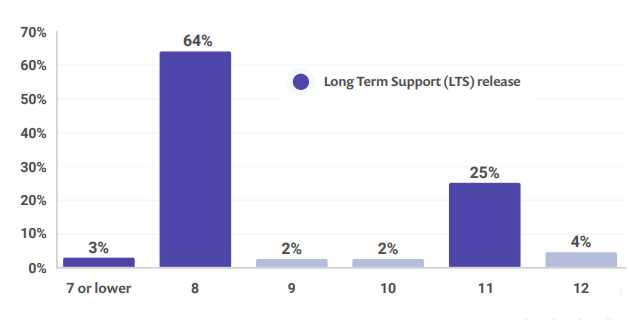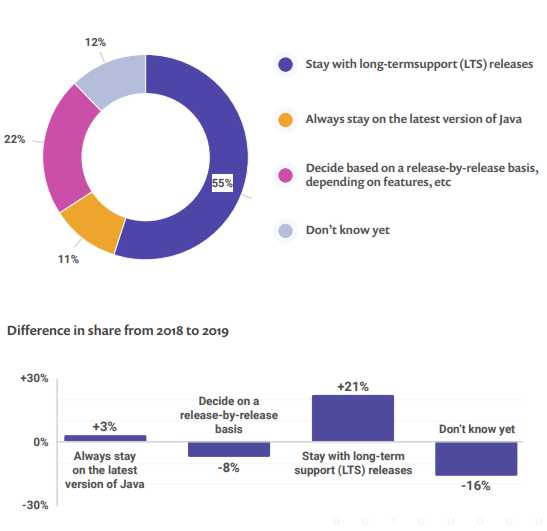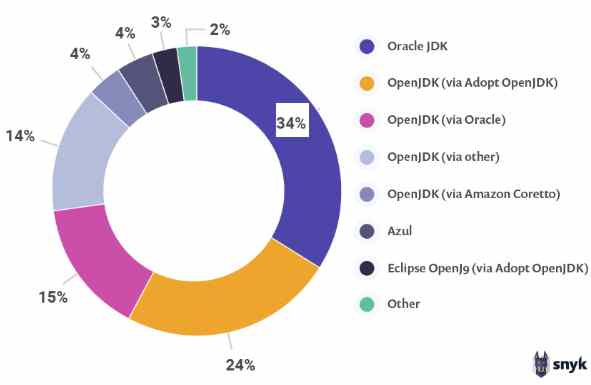| Java 8 Remains Dominant |
| Written by Janet Swift | |||
| Thursday, 06 February 2020 | |||
|
While a quarter of Java developers are running the most recent Long Term Support version, Java 11, almost two thirds still use Java 8 and only 4% have adopted Java 12. This finding comes from the 2020 JVM Ecosystem Survey Report from Snyk using result results from a survey that gathered over 2000 responses in the second half of 2019. If this headline seems familiar it's because back in 2018 we reported based on the findings of the previous JVM Ecosystem Report (2018) when almost 9 out of 10 Java Devs used Java 8 or earlier versions so there has been a considerable shift towards being up-to-date. This time around respondents were asked for their reasons for not moving to a more recent version. The predominant answer, given by over half, was that as the version in use worked they saw no reason to upgrade and over a quarter claimed there were no new features they required in later versions. The cost of migration was cited by nearly a third and almost as many blamed business decision makers. Back in 2018 the snyk report noted a marked preference for staying with the long-term support releases and this propensity has intensified such that over half of respondents now take this approach to adopting new JDK releases: The report comments: The plan for most people (55%) is to stick with long term releases. That is hardly surprising as these versions are released every 3 years, similar to the cadence people are already familiar with in the JDK ecosystem. Still, 22% of the respondents report that they plan to decide whether or not to upgrade on a release-by-release basis to see if the newly introduced features are important enough to justify migrating.: One major shift reported in the latest report is a 72% swing from the Oracle JDK to alternate OpenJDK providers. Whereas in 2018 Oracle JDK accounted for 70% and OpenJDK for 21% of the preferred JDK distribution, Oracle's proprietary share has shrunk to 34% while that of Open JDK has grown to over 60%. We recently drew attention to the growing status of the OpenJDK in our report Microsoft Will Contribute To OpenJDK. Only 9% of respondents are paying a vendor for JDK support. As a majority of those paid Oracle (55%) the other way to regard it is that 1 in 20 pay Oracle. The other interesting change from last year is that Kotlin is now the second most popular language on the JVM. Its share may only be 5.5% but that's up from 2.4% last year. Clojure's share remains almost the same 2.9% this year as opposed to 3.0% last and Scala's has increased from 1.8% to 2.6%. Java of course is by far the most used language on the JVM - but its share decline from 90% to 87%. More InformationJVM Ecosystem Report 2020 (pdf) Related ArticlesJVM Ecosystem Report Reveals the State of Java Microsoft Will Contribute To OpenJDK Java 12 Released With Switch Expressions Kotlin Enters RedMonk's Top 20 Kotlin Versus Java - A Developer's Rosetta Stone To be informed about new articles on I Programmer, sign up for our weekly newsletter, subscribe to the RSS feed and follow us on Twitter, Facebook or Linkedin.
|
|||
| Last Updated ( Wednesday, 27 May 2020 ) |





